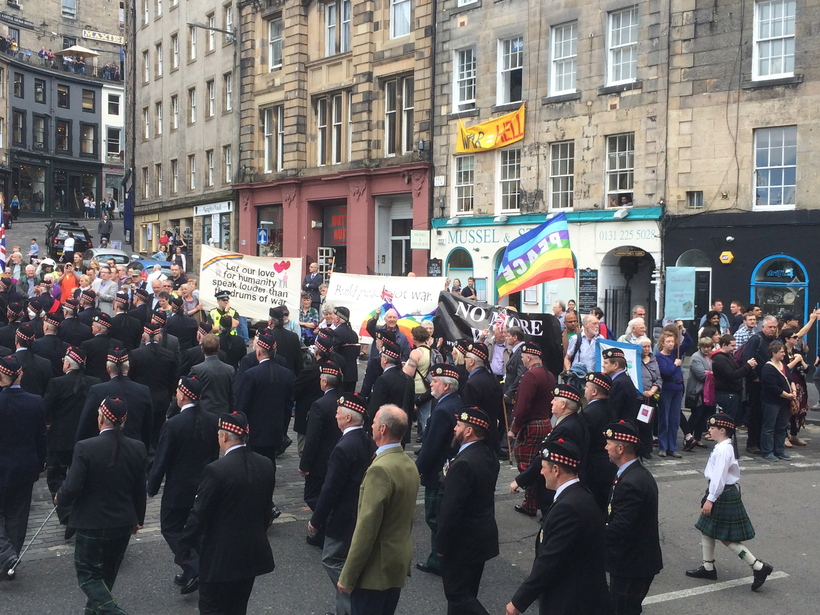The courage of our convictions
Over the past two years South East Scotland Friends have been developing a concern about increasing militarisation in society. We heard that Edinburgh was to be a focus for Armed Forces Day, and thought it would be a good opportunity to make our concern more public. We planned a joint witness with the Scottish Peace Network.

Responding to a leading
In conversations beforehand, some Friends were concerned that it might seem disrespectful or negative and decided not to take part. One felt that we should just 'leave them to it' and ignore the whole thing. But several of us felt led to do something, especially as the parade was scheduled very close to Edinburgh's Meeting House.
We planned a joint witness with the Scottish Peace Network, and on 27 June some two dozen Friends and friends of Friends gathered at the Meeting House to prepare banners and placards. We did not intend to disrupt proceedings but to quietly express a different message to the one being promoted.
We had written a leaflet, with the help of QPSW staff, that was simple, clear and to the point. We stood with our placards behind or in the crowd as they watched the bands and applauded the veterans (all long past service age). Some would accept leaflets, but many wouldn't. At the end there was kind of fair with warfare portrayed as family entertainment.
Met with bafflement
The Armed Forces Day website lists the purposes of the military: the first two in the list are 'promoting peace' and 'delivering aid'. So it's not surprising that we were often met with bafflement, and sometimes hostility, in a crowd that had come to support the event. There was interest from some tourists, who perhaps had less emotional investment. There are always plenty of visitors to Edinburgh and I expect that photos of our Quaker banners will have found their way across the world!
Discussion afterwards highlighted how difficult it was to offer an on-the-spot positive alternative, when people want instant results. Some were angry – their cherished beliefs were being challenged, however gently. One Friend felt that it gave her insight into the treatment COs received. Some typical comments we heard:
"I suppose you'd just have let the Germans in to kill and rape everyone."
"These guys put their lives on the line so you could stand here and offend people."
"Are you just going to let them behead people?"
"We have to fight to defend Christianity."
With hindsight, we could have spent a bit more time preparing for this type of response, although others were more positive.
After the event an email arrived at the Meeting House, expressing disgust and anger at our presence. After some thought, we felt it right to respond rather than ignore it. We replied regretting the writer's distress, but making no apology for being there.
Framing our message
It seems that all 'peace' means for many people is the lull between wars. If we are going to make a meaningful contribution to changing our society perhaps we need to be better prepared, more thoughtful – and smarter – in the way we frame our message, so that more people are open to hearing it.